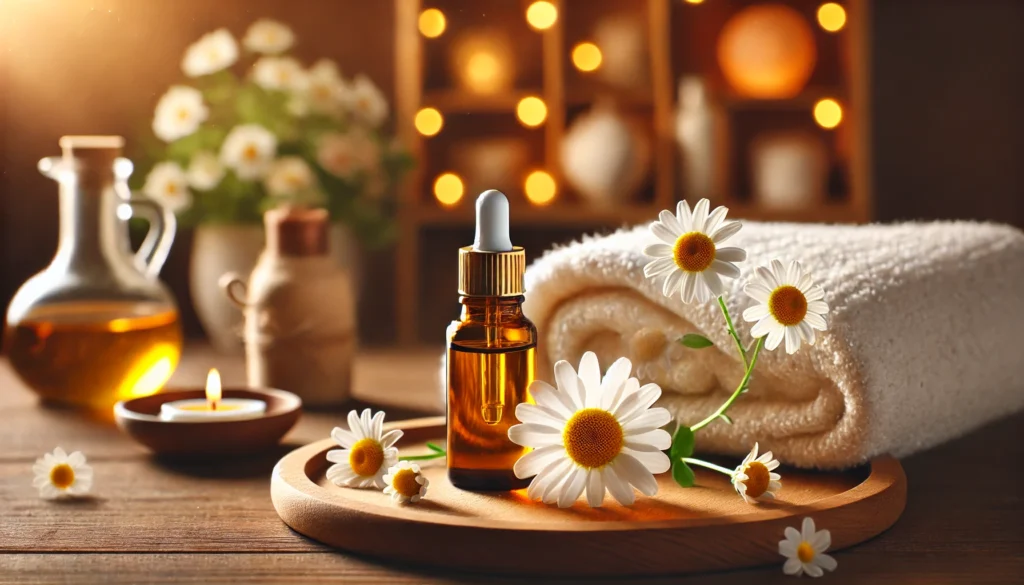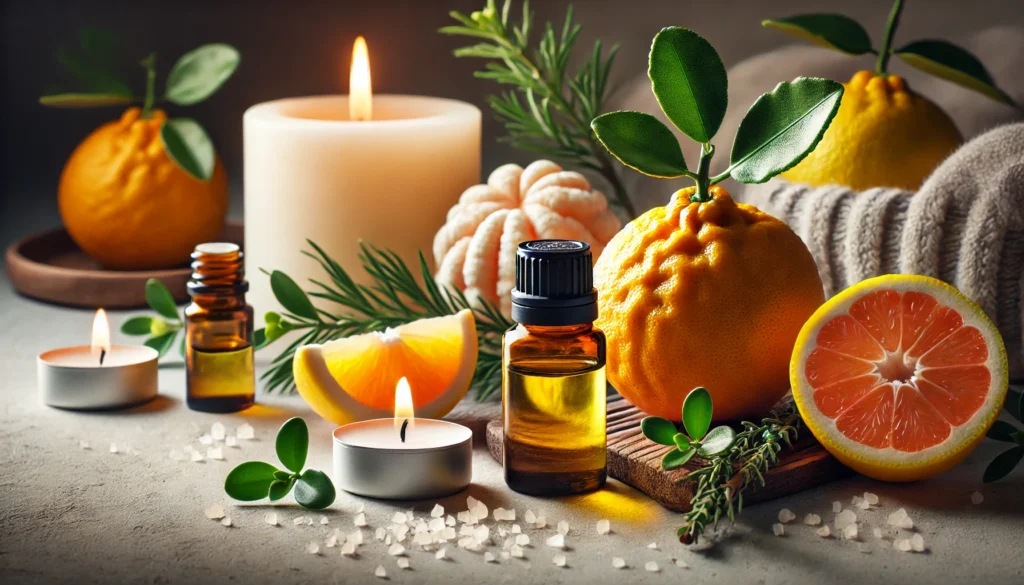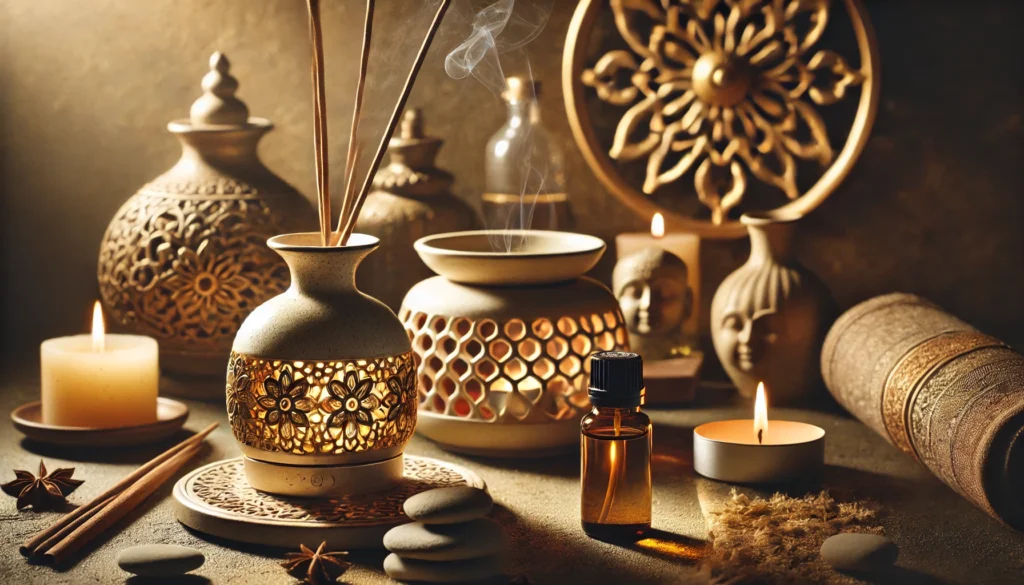In an era where stress has become an inescapable companion, finding effective strategies for relaxation is more crucial than ever. Aromatherapy, a centuries-old practice, offers a natural solution through the power of essential oils. These aromatic compounds, extracted from plants, have been used historically for their therapeutic properties. Today, they are recognized for their ability to promote relaxation and alleviate anxiety. Let’s delve into the top five calming aromatherapy oils that can help you unwind and find peace in a hectic world.
You may also like: Top 10 Herbs for Stress Relief
1. Lavender Oil: The Quintessential Calming Oil
Lavender oil stands as a paragon in the realm of calming oils. Renowned for its soothing scent, lavender has been a staple in traditional medicine for centuries. Its calming properties are well-documented, making it a popular choice for those seeking to reduce stress and anxiety. Studies suggest that lavender oil can decrease heart rate and blood pressure, aiding in relaxation and sleep quality. Whether used in a diffuser or applied topically, lavender remains a cornerstone in aromatherapy for stress relief.
The Science Behind Lavender
The efficacy of lavender oil is attributed to its active components, such as linalool and linalyl acetate, which interact with the limbic system—the part of the brain that controls emotions. This interaction promotes a calming effect on the nervous system, making lavender a powerful ally against anxiety and stress. These compounds are known to influence neurotransmitter activity, which can help to stabilize mood and enhance overall emotional well-being.
Historical Significance of Lavender
Lavender has been utilized since ancient times, with records dating back to Roman and Egyptian civilizations where it was used for mummification and scenting baths. Its historical significance in herbal medicine is a testament to its enduring popularity as a therapeutic agent. The Romans were particularly fond of lavender, using it in their bathhouses to create a relaxing ambiance.
Modern Uses of Lavender
Today, lavender oil is a staple in both personal care and household products. Its versatility is evident in its wide range of applications, from skincare products to cleaning solutions. Many people incorporate lavender into their bedtime routine, using lavender-infused pillows or linen sprays to enhance sleep quality. The modern spa industry also capitalizes on lavender’s calming effects, frequently using it in massages and facials.
2. Chamomile Oil: A Gentle Embrace for the Mind
Chamomile, often associated with calming teas, also offers its soothing properties in the form of essential oil. Known for its mild sedative effects, chamomile oil is particularly beneficial for those experiencing anxiety or insomnia. Its gentle aroma provides a sense of tranquility, facilitating a peaceful state of mind.
Historical Context of Chamomile Use
Chamomile has a storied history, dating back to ancient Egypt where it was revered for its medicinal uses. The Greeks and Romans also utilized chamomile for its calming effects, a testament to its enduring legacy in herbal medicine. In medieval times, chamomile was used in strewing herbs to improve air quality and promote relaxation in domestic settings.
Chamomile in Cultural Practices
Different cultures have incorporated chamomile into their healing rituals and traditions. In Europe, it was often used in rituals to ward off evil spirits and attract good fortune. In the Middle East, chamomile is a key component of traditional healing practices, where it is used to treat a variety of ailments. Its cultural significance underscores its universal appeal as a calming agent.
Scientific Studies on Chamomile
Recent scientific studies have validated the calming effects of chamomile, confirming its role in reducing anxiety and promoting sleep. Research has shown that chamomile contains apigenin, an antioxidant that binds to certain receptors in the brain that may decrease anxiety and initiate sleep. These findings support the traditional uses of chamomile and highlight its potential as a natural remedy for stress-related disorders.

3. Bergamot Oil: Lifting Spirits with Citrus
Bergamot oil, derived from the rind of the bergamot orange, offers a refreshing citrus scent that uplifts the mood and eases anxiety. Unlike other citrus oils, bergamot has unique calming properties that make it an excellent choice for stress relief. Research indicates that inhaling bergamot oil can reduce cortisol levels, the body’s primary stress hormone, promoting a sense of well-being.
The Unique Chemistry of Bergamot
The unique chemistry of bergamot oil is attributed to its rich composition of linalool and limonene, which contribute to its mood-enhancing effects. These compounds have been shown to possess anxiolytic properties, making bergamot oil particularly effective in stress management. The interplay between these components provides bergamot with its distinctive ability to both energize and calm.
Historical Uses of Bergamot
Historically, bergamot was used in traditional Italian medicine for its antiseptic and antibacterial properties. It was a key ingredient in early perfumes and was also used to flavor Earl Grey tea, adding a unique twist to its aromatic profile. The historical uses of bergamot highlight its versatility and enduring popularity across different sectors.
Current Trends in Bergamot Usage
In recent years, bergamot oil has gained popularity in aromatherapy blends for its dual ability to invigorate and calm. Its versatility makes it a favored ingredient in products designed for both relaxation and mood enhancement. The cosmetic industry has also embraced bergamot, incorporating it into skincare products for its purported benefits in promoting a clear, healthy complexion.
4. Frankincense Oil: Ancient Wisdom for Modern Stress
Frankincense oil, a staple in religious and cultural ceremonies, offers profound calming effects that are as relevant today as they were in ancient times. Known for its grounding properties, frankincense helps to slow down breathing and induce a meditative state. It is particularly useful in managing stress and anxiety, making it a valuable addition to any relaxation routine.
Historical Significance of Frankincense
Frankincense has been used for thousands of years in religious and spiritual practices. It was one of the gifts presented to the Christ child, symbolizing its sacred nature. Ancient Egyptians used frankincense in embalming rituals and as an offering to deities. Its historical significance is deeply rooted in its perceived ability to connect the earthly with the divine.
Frankincense in Modern Wellness
In contemporary wellness practices, frankincense is revered for its ability to enhance meditation and mindfulness. Many practitioners use frankincense oil in yoga and meditation to deepen their practice and achieve a state of inner calm. Its grounding scent is believed to help center the mind and focus attention, making it a popular choice for mental clarity.
Future Implications of Frankincense
With ongoing research into its therapeutic benefits, frankincense oil holds promise for future applications in stress management and holistic health practices. Its potential in enhancing meditation and mindfulness practices is being explored, offering new avenues for relaxation and mental clarity. As scientific understanding of its benefits continues to grow, frankincense may become an integral part of modern stress-relief strategies.

5. Ylang Ylang Oil: A Floral Escape from Anxiety
Ylang ylang oil, with its rich floral fragrance, is celebrated for its ability to ease tension and promote relaxation. Originating from the tropical regions of Asia, ylang ylang is commonly used in perfumes and aromatherapy for its mood-enhancing properties. It has been shown to reduce anxiety and improve self-esteem, making it an excellent choice for those seeking emotional balance.
Botanical Characteristics of Ylang Ylang
Ylang ylang is derived from the Cananga tree, which thrives in tropical climates. The essential oil is extracted from the flowers, which are known for their potent aroma and vibrant yellow color. The harvesting of ylang ylang flowers is a delicate process, requiring careful timing to ensure maximum fragrance and therapeutic efficacy.
Cultural and Traditional Uses
In many Asian cultures, ylang ylang is used in traditional ceremonies and rituals to invoke a sense of calm and joy. It is a common ingredient in love potions and aphrodisiacs, reflecting its reputation as a mood enhancer. The cultural significance of ylang ylang adds a layer of richness to its use in modern aromatherapy.
Practical Advice for Ylang Ylang Use
To fully experience the benefits of ylang ylang oil, consider incorporating it into your daily routine. Whether diffused in the air, added to a warm bath, or blended into a massage oil, ylang ylang offers a delightful escape from the pressures of daily life. For a simple relaxation ritual, add a few drops to a carrier oil and apply to the pulse points for an immediate calming effect.

Conclusion: Embracing Aromatherapy for a Calmer Life
Aromatherapy, with its rich history and growing body of scientific support, offers a natural pathway to relaxation and stress relief. By integrating these top five calming oils into your wellness routine, you can harness the power of nature to soothe your mind and uplift your spirit. Whether you are a health and wellness coach seeking reliable resources, a science journalist translating complex information, or a biohacker optimizing mental health, these essential oils provide a versatile and effective tool in the quest for relaxation.
The Science Behind Aromatherapy
The science of aromatherapy is based on the interaction of essential oil molecules with the olfactory system and limbic brain structures. This interaction influences mood and emotional states, providing a physiological basis for the calming effects observed. Aromatherapy is also being studied for its potential impact on neurotransmitter activity, which could offer insights into its broader therapeutic benefits.
Practical Applications in Daily Life
Incorporating aromatherapy into your daily life can be as simple as using a diffuser or applying oils topically with a carrier oil. Creating a dedicated space for relaxation, enriched with your chosen oils, can enhance your overall well-being. Regular use can help establish a routine that supports mental health and emotional balance, offering a sanctuary from the stressors of everyday life.
Embracing a Holistic Approach
Embrace the therapeutic benefits of aromatherapy and discover a new level of tranquility in your life. With each breath, let the calming scents guide you to a place of peace and rejuvenation. By combining aromatherapy with other stress-reduction techniques, such as meditation and exercise, you can create a holistic approach to wellness that nurtures both body and mind.
Further Reading:
Which essential oils can relieve anxiety?
Aromatherapy: Do Essential Oils Really Work?
Can You Reduce Stress With Aromatherapy?
Important Note: The information contained in this article is for general informational purposes only, and should not be construed as health or medical advice, nor is it intended to diagnose, prevent, treat, or cure any disease or health condition. Before embarking on any diet, fitness regimen, or program of nutritional supplementation, it is advisable to consult your healthcare professional in order to determine its safety and probable efficacy in terms of your individual state of health.
Regarding Nutritional Supplements Or Other Non-Prescription Health Products: If any nutritional supplements or other non-prescription health products are mentioned in the foregoing article, any claims or statements made about them have not been evaluated by the U.S. Food and Drug Administration, and such nutritional supplements or other health products are not intended to diagnose, treat, cure, or prevent any disease.


